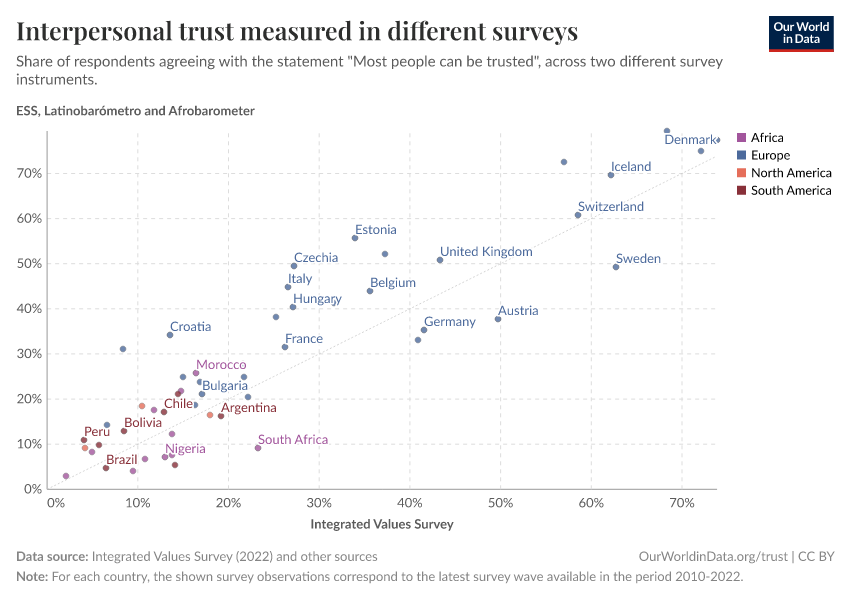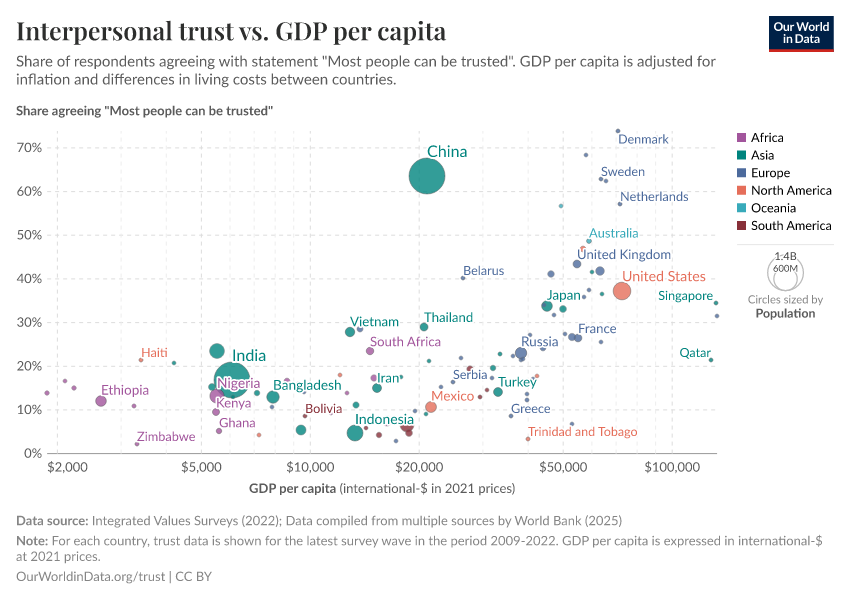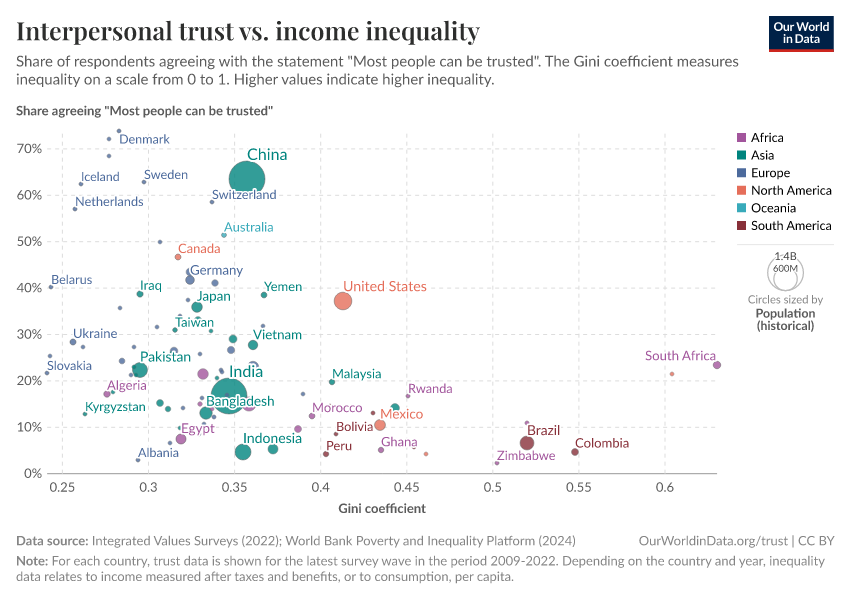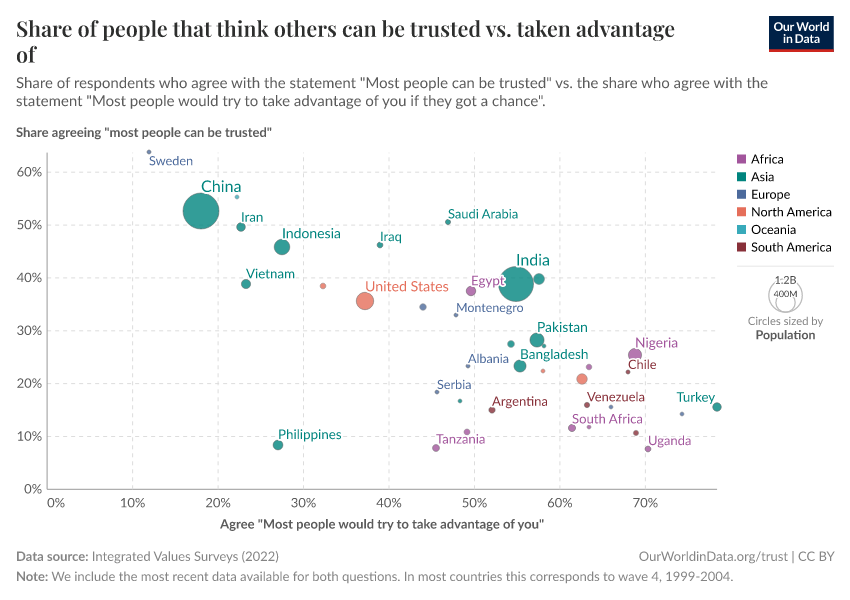Share of people agreeing with the statement "most people can be trusted"

What you should know about this indicator
- When available, we consider “Don’t know” and “No answer” to be valid response categories and include them in percentage calculations. “Missing” responses, however, are excluded from the set of possible answers.
- The years in the data represent the latest year of each Integrated Values Surveys wave, which is not necessarily the year of the survey. For example, the 2022 wave (IVS wave 7) includes surveys conducted between 2017 and 2022. This is done to improve comparability across waves.
Related research and writing
What you should know about this indicator
- When available, we consider “Don’t know” and “No answer” to be valid response categories and include them in percentage calculations. “Missing” responses, however, are excluded from the set of possible answers.
- The years in the data represent the latest year of each Integrated Values Surveys wave, which is not necessarily the year of the survey. For example, the 2022 wave (IVS wave 7) includes surveys conducted between 2017 and 2022. This is done to improve comparability across waves.
Sources and processing
This data is based on the following sources
How we process data at Our World in Data
All data and visualizations on Our World in Data rely on data sourced from one or several original data providers. Preparing this original data involves several processing steps. Depending on the data, this can include standardizing country names and world region definitions, converting units, calculating derived indicators such as per capita measures, as well as adding or adapting metadata such as the name or the description given to an indicator.
At the link below you can find a detailed description of the structure of our data pipeline, including links to all the code used to prepare data across Our World in Data.
Notes on our processing step for this indicator
We collected the data by merging the World Values Survey and the European Values Study, following the methodology described in the Integrated Values Surveys (IVS) website.
We processed the indicators from microdata of the IVS using Stata. Weights are applied for each country.
We consider “Don’t know” and “No answer” to be valid response categories and include them in percentage calculations. “Missing” responses, however, are excluded from the set of possible answers.
We processed the years in the data to represent the latest year of each IVS wave, which is not necessarily the year of the survey. For example, the 2022 wave (IVS wave 7) includes surveys conducted between 2017 and 2022.
Reuse this work
- All data produced by third-party providers and made available by Our World in Data are subject to the license terms from the original providers. Our work would not be possible without the data providers we rely on, so we ask you to always cite them appropriately (see below). This is crucial to allow data providers to continue doing their work, enhancing, maintaining and updating valuable data.
- All data, visualizations, and code produced by Our World in Data are completely open access under the Creative Commons BY license. You have the permission to use, distribute, and reproduce these in any medium, provided the source and authors are credited.
Citations
How to cite this page
To cite this page overall, including any descriptions, FAQs or explanations of the data authored by Our World in Data, please use the following citation:
“Data Page: Share of people agreeing with the statement "most people can be trusted"”, part of the following publication: Esteban Ortiz-Ospina, Max Roser, and Pablo Arriagada (2016) - “Trust”. Data adapted from Integrated Values Surveys. Retrieved from https://archive.ourworldindata.org/20260113-113137/grapher/self-reported-trust-attitudes.html [online resource] (archived on January 13, 2026).How to cite this data
In-line citationIf you have limited space (e.g. in data visualizations), you can use this abbreviated in-line citation:
Integrated Values Surveys (2024) – with major processing by Our World in DataFull citation
Integrated Values Surveys (2024) – with major processing by Our World in Data. “Share of people agreeing with the statement "most people can be trusted" – Integrated Values Surveys” [dataset]. Integrated Values Surveys, “Integrated Values Surveys (IVS) Version 4” [original data]. Retrieved February 25, 2026 from https://archive.ourworldindata.org/20260113-113137/grapher/self-reported-trust-attitudes.html (archived on January 13, 2026).


